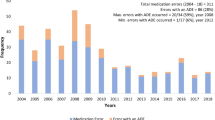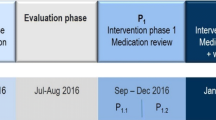Abstract
Background Errors occurring during different steps of the medication process can lead to adverse drug events (ADEs). Surgical patients are expected to have an increased risk for ADEs during hospitalization. However, detailed information about ADEs in the surgical patient is lacking. Objective In this study, we aim to measure the incidence and nature of (preventable) ADEs, potential risk factors for and outcome parameters of (preventable) ADEs in surgical patients. Setting Observational multicentre cohort study in which eight surgical wards participated from three Dutch hospitals, all using computerized physician order entry (CPOE) systems with clinical decision support. Methods Electively admitted surgical patients of the participating wards were included from March until June 2009. ADEs were measured using a standardized method with expert judgment. Incidence, severity, preventability and accountable medication were assessed. Poisson regression analysis was applied to determine the associations between possible risk factors and the occurrence of ADEs, expressed as incidence rate ratio (IRR). Also outcomes of ADEs in surgical patients were measured. Main outcome measure The incidence and nature of (preventable) ADEs in surgical patients. Results A total of 567 surgical patients were included. We found an incidence of 27.5 ADEs and 4.2 preventable ADEs (pADEs) per 100 admissions (15.4 %). A quarter of the pADEs were severe or life-threatening. Opioids and anti-coagulation medication play a major role in the occurrence of ADEs and pADEs respectively. Univariate analysis revealed an American Society of Anesthesiologists classification of III or more as a risk factor for ADEs. Patients older than 65 years [IRR 2.77 (1.14–6.72)], with cardiovascular comorbidity [IRR 2.87 (1.13–7.28)], or undergoing vascular surgery [IRR 2.32 (1.01–5.32)] were at risk for pADEs. Patients experiencing an ADE had a significant longer duration of admission than patients without an ADE. Conclusions Surgical patients are at considerable risk of experiencing one or more ADEs during their admission, also in CPOE-hospitals. Risk factors for pADEs are age older than 65 years, cardiovascular comorbidity, and vascular surgery. Intensified monitoring may be needed in patients with a higher than average risk for pADEs.

Similar content being viewed by others
References
Leape LL, Brennan TA, Laird N, Lawthers AG, Localio AR, Barnes BA, et al. The nature of adverse events in hospitalized patients. Results of the Harvard Medical Practice Study II. N Engl J Med. 1991;324(6):377–84.
Morimoto T, Gandhi TK, Seger AC, Hsieh TC, Bates DW. Adverse drug events and medication errors: detection and classification methods. Qual Saf Health Care. 2004;13(4):306–14.
Cano FG, Rozenfeld S. Adverse drug events in hospitals: a systematic review. Cad saude publica. 2009;25(3):360–72.
Kanjanarat P, Winterstein AG, Johns TE, Hatton RC, Gonzalez-Rothi R, Segal R. Nature of preventable adverse drug events in hospitals: a literature review. Am J Health Syst Pharm. 2003;60(17):1750–9.
de Vries EN, Ramrattan MA, Smorenburg SM, Gouma DJ, Boermeester MA. The incidence and nature of in-hospital adverse events: a systematic review. Qual Saf Health Care. 2008;17(3):216–23.
Bates DW, Miller EB, Cullen DJ, Burdick L, Williams L, Laird N, et al. Patient risk factors for adverse drug events in hospitalized patients. ADE Prevention Study Group. Arch Intern Med. 1999;159(21):2553–60.
de Vries EN, Prins HA, Crolla RMPH, den Outer AJ, van Andel G, van Helden SH, et al. Effect of a comprehensive surgical safety system on patient outcomes. N Engl J Med. 2010;363(20):1928–37.
Lazarus HM, Fox J, Evans RS, Lloyd JF, Pombo DJ, Burke JP, et al. Adverse drug events in trauma patients. J Trauma. 2003;54(2):337–43.
Morimoto T, Sakuma M, Matsui K, Kuramoto N, Toshiro J, Murakami J, et al. Incidence of adverse drug events and medication errors in Japan: the JADE study. J Gen Inter Med. 2011;26(2):148–53.
Bates DW, Cullen DJ, Laird N, Petersen LA, Small SD, Servi D, et al. Incidence of adverse drug events and potential adverse drug events. Implications for prevention. ADE Prevention Study Group. JAMA. 1995;274(1):29–34.
Berga C, Gorgas Torner M, Altimiras R, Tuset CM, Besalduch MM, Capdevilla SM, et al. Detecting adverse drug events during hospital stay. Farm Hosp. 2009;33(6):312–23.
Nebeker JR, Hoffman JM, Weir CR, Bennet CL, Hurdle JF. High rates of adverse drug events in a highly computerized hospital. Arch Intern Med. 2005;165(10):1111–6.
de Boer M, Kiewiet JJS, Boeker EB, Ramrattan MA, Dijkgraaf MGW, Lie-A-Huen L, et al. A targeted method for standardized assessment of adverse drug events in surgical patients. J Eval Clin Pract 2013 [Epub ahead of print].
Euroqol (EQ). EQ-5D. Available at: http://www.euroqol.org/. Accessed 2010.
WHO Collaborating Centre for Drug Statistics Methodology. Anatomical therapeutic chemical classification system. Available at: http://www.whocc.no/. Accessed 2012.
Cullen DJ, Sweitzer BJ, Bates DW, Burdick E, Edmondson A, Leape LL. Preventable adverse drug events in hospitalized patients: a comparative study of intensive care and general care units. Crit Care Med. 1997;25(8):1289–97.
Cancer Therapy Evaluation Program. Common Terminology Criteria for Adverse Events v4.0. Available at: http://www.cancer.gov/. Accessed 2010.
de Boer M, Ramrattan MA, Kiewiet JJ, Boeker EB, Gombert-Handoko KB, van Lent-Evers NAEM, et al. Cost-effectiveness of ward-based pharmacy care in surgical patients: protocol of the SUREPILL (Surgery & Pharmacy In Liaison) study. BMC Health Serv Res. 2011;11(1):55.
Contributors
We would like to thank the hospital pharmacy departments and the surgical departments of the Academic Medical Centre Amsterdam, the Onze Lieve Vrouwe Gasthuis Amsterdam and the Diakonessenhuis Utrecht for their participation in this study.
Collaborators
Eric J.F. Franssen, PharmD PhD and Kim B. Gombert-Handoko, PharmD PhD, Department of Hospital Pharmacy, and Anco C. Vahl, MD PhD, Department of Surgery, Onze Lieve Vrouwe Gasthuis, Amsterdam, The Netherlands. Gerard W.K. Hugenholtz, PharmD PhD and Nicolette A.E.M. van Lent-Evers, PharmD, Department of Hospital Pharmacy, and Suresh K. Nagesser, MD PhD, Department of Surgery, Diakonessenhuis, Utrecht, The Netherlands. Minke E.J. Jansen, PharmD, Department of Hospital Pharmacy, Academic Medical Centre, Amsterdam, The Netherlands.
Expert panels
Paul F.M. Kuks, PharmD PhD and Wilhelmina M.C. Mulder, MD PhD, Department of Hospital Pharmacy, Academic Medical Centre, Amsterdam, The Netherlands. Paul J. Breslau, MD PhD, Royal Dutch Medical Association (KNMG), The Hague, The Netherlands. Rob J. Oostenbroek, MD PhD, Department of Surgery, Albert Schweitzer Hospital, Dordrecht, The Netherlands.
Funding
This study was made possible by funding of ZonMw, The Netherlands Organization for Health Research and Development (project number 170882706). ZonMw approved the SUREPILL study protocol [18].
Conflicts of interest
None.
Author information
Authors and Affiliations
Corresponding author
Additional information
This study is conducted on behalf of the SUREPILL study group. The SUREPILL study group members are listed in “Acknowledgements”.
Rights and permissions
About this article
Cite this article
de Boer, M., Boeker, E.B., Ramrattan, M.A. et al. Adverse drug events in surgical patients: an observational multicentre study . Int J Clin Pharm 35, 744–752 (2013). https://doi.org/10.1007/s11096-013-9797-5
Received:
Accepted:
Published:
Issue Date:
DOI: https://doi.org/10.1007/s11096-013-9797-5




